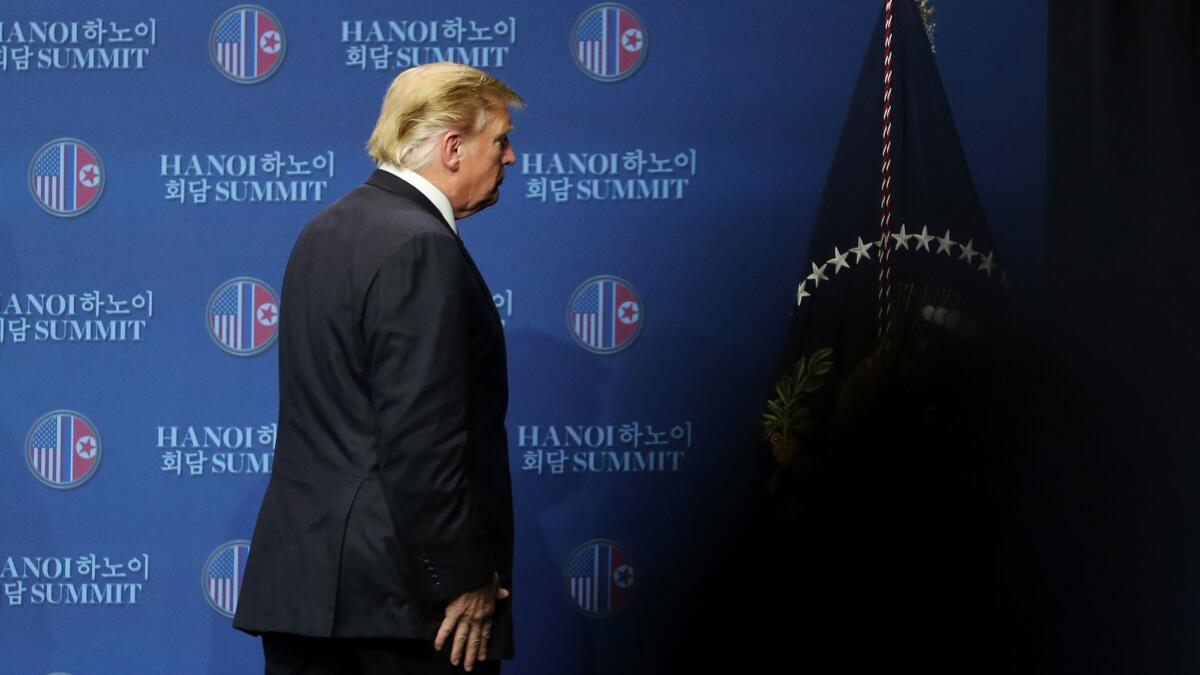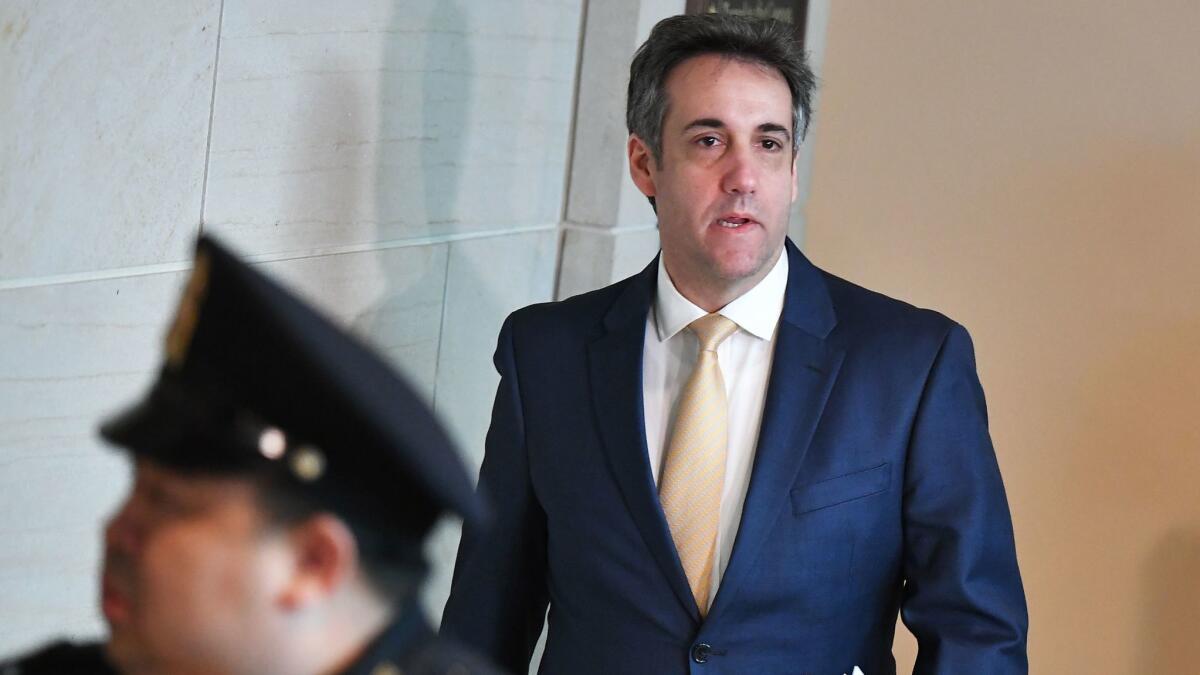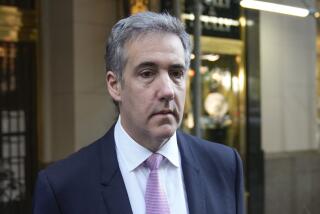After failed summit, Trump heads home to fresh dangers from Michael Cohen’s accusations

Reporting from Washington — President Trump flew home Thursday from his failed nuclear summit with North Korea to face a new round of peril as members of Congress vowed to follow up on his former lawyer’s claims of misdeeds and possible crimes by the president.
Michael Cohen’s explosive testimony Wednesday before the House Committee on Oversight and Reform scattered bread crumbs for Democrats to follow as they investigate Trump’s role in alleged schemes involving insurance fraud, bank fraud and tax evasion.
They’re also scrutinizing alleged payments of $280,000 to two women in late 2016 to keep silent about their affairs with Trump. Prosecutors have said the hush-money scheme violated campaign finance law.
Cohen’s detailed and often lurid accusations set the stage for committees to summon other Trump insiders, including the Trump Organization’s top accountant, Allen Weisselberg, and longtime executive Matthew Calamari, to substantiate or rebut his claims.
Donald Trump Jr. and Ivanka Trump, the president’s eldest son and daughter, also could be hauled to Capitol Hill to testify.
“We’re going to follow up on this testimony,” said Rep. Elijah E. Cummings (D-Md.), the Oversight Committee’s chairman. “We will do things in a very methodical way, a very careful way.”
Cummings said Democrats would not rush toward impeachment proceedings in the House despite the urging of some liberal activists and fundraisers. “Not one person on our side even mentioned the word impeachment” during the daylong hearing, he said.
For his part, Trump told reporters before he left Vietnam that Cohen “lied about so many different things.”
But he said he was “impressed” that Cohen admitted he didn’t have direct evidence of a conspiracy between the Trump campaign and the Kremlin in the 2016 campaign, just as Trump has long insisted.

Republicans on the committee stepped up their attacks on Cohen’s credibility. In a letter, they asked Atty. Gen. William Barr to investigate whether Cohen committed perjury at the hearing by saying, among other things, that he didn’t want a White House job after Trump won.
The move is unlikely to derail Democrats’ plans to use Cohen’s appearance on Capitol Hill as the starting gun for a series of committee investigations that could soon engulf the president’s scandal-plagued administration.
The hearing also made clear that Trump may face greater legal jeopardy from federal prosecutors in Manhattan than from special counsel Robert S. Mueller III, who is chiefly investigating Russian meddling in the election.
Cohen is cooperating with both Mueller and the New York prosecutors in hopes of reducing his three-year prison sentence for lying to Congress, campaign finance violations, tax evasion and bank fraud. He’s scheduled to report to prison on May 6.
Cohen’s testimony clearly distracted Trump in Hanoi. He told reporters that “I tried to watch as much as I could” on TV between his meetings with North Korean leader Kim Jong Un in a summit that ultimately led to no agreement.
Neither Trump nor his allies on the committee refuted any of Cohen’s specific allegations about hush-money payments or financial irregularities.
“There hasn’t been one Republican yet who has tried to defend the president on the substance, and I think that’s something that should be concerning to the White House,” Chris Christie, who served as U.S. attorney in New Jersey before he was elected governor there, told ABC News.
Lawyers and legal experts said Cohen’s testimony didn’t seal the case against the president.
“The hearing was great entertainment but it really offered nothing new legally for prosecutors to work with,” said Louis Shapiro, a prominent Los Angeles attorney who handles high-profile federal cases.
Jonathan Meyer, a former deputy assistant attorney general in the Justice Department, said Cohen’s account was “one piece among many other pieces of evidence that, taken together, could be useful.”
Investigators generally want a paper trail, such as emails and text messages, to outline a criminal conspiracy. Cohen recorded Trump on the phone at times, but he told lawmakers that he had no tapes of Trump telling him to lie.
Cohen did bring a copy of a check for $35,000 that Trump signed in August 2017, after he was in the White House. He said it was partial reimbursement for the $130,000 he paid Stormy Daniels to keep silent about her alleged affair with Trump. Cohen also arranged for the National Enquirer to pay $150,000 to Karen McDougal, another alleged mistress.
“No prosecutor would rely solely on Cohen to convict Trump,” said Steve Levin, a former federal prosecutor. “That’s why corroboration is so important. And he has corroboration.”
Trump’s allies hammered at Cohen’s credibility during the hearing, repeatedly noting that he had previously lied to Congress, banks and the Internal Revenue Service.
Cohen may have given his critics fodder during a heated exchange with Rep. Jim Jordan (R-Ohio), the committee’s top Republican.
Jordan accused Cohen of turning on Trump because he “didn’t get brought to the dance” and wasn’t offered a White House job. Cohen repeatedly denied that and insisted he got the position he wanted.
“All I wanted was what I got, to be personal attorney to the president,” he said.
Several Republicans and Trump insiders chimed in on Twitter and in interviews to suggest otherwise.
“Michael Cohen asked … no, BEGGED me REPEATEDLY, to ask the POTUS to give him a job in the Administration!” tweeted Pastor Darrell Scott, a Trump supporter.
David Bossie, an outside advisor to the president, tweeted that Cohen “asked me to support his effort to be Chief of Staff when I helped run the Presidential Transition Team. He perjured himself today.”
Lanny Davis, a lawyer for Cohen, said he “testified truthfully.” Davis called the Republicans’ criminal referral “a sad misuse of the criminal justice system with the aura of pure partisanship.”
Times staff writers Del Quentin Wilber in Washington and Joel Rubin and Richard Winton in Los Angeles contributed to this report.
More to Read
Get the L.A. Times Politics newsletter
Deeply reported insights into legislation, politics and policy from Sacramento, Washington and beyond. In your inbox three times per week.
You may occasionally receive promotional content from the Los Angeles Times.











